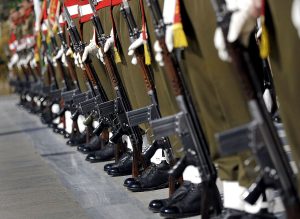On May 24, Pakistani authorities in Quetta hosted a press event with Gulzar Imam, the captured leader of the Balochistan National Army insurgent group. Imam, who had been a militant since 2009, claimed that time in custody had changed his views: “Now the time has come that the government, establishment, and militants who were [living] in the mountains should rectify their mistakes and play their role for the development of Balochistan.”
Pakistan’s security forces have failed to extinguish the insurgency since fighting broke out in Balochistan province in 2005. The insurgents tap into deep-seated grievances held by the ethnic Baloch population, which has long felt that their homeland’s resources are being exploited to benefit the elites in Islamabad. On development metrics from per capita income to literacy rates, Balochistan lags far behind the rest of the country. Local resentment has only been exacerbated by the central government’s open welcome of Chinese investment projects in the province, which Baloch fear will drive an influx of migration that will further marginalize them.
While the Pakistani Army announced Imam’s arrest in April, Pakistan’s Inter-Services Intelligence has likely held Imam covertly since September 2022, as reported in The Diplomat. Imam’s arrest was controversial, but his removal from the battlefield had a negligible effect on the fighting. The Balochistan Liberation Army, a separate but allied insurgent group, conducted a series of attacks in several towns across the province shortly after authorities announced Imam’s arrest. Further, data from the Pakistan Institute for Conflict and Security Studies showed that attacks in Balochistan increased slightly in April. Thus far in May, insurgents have thrown grenades at telecommunications facilities, seized hostages during a raid on a military barracks, and killed security forces protecting coal miners.
Islamabad’s reaction to the Baloch insurgency has been harsh, but large-scale clearing operations by the Pakistan Army are rare in the province. Instead, the security forces established a network of checkpoints to protect population centers, lines of communication, and key infrastructure. Pakistani authorities have also expanded intelligence-based operations and tactical raids to target insurgent leaders. The effectiveness of this strategy is an open question, given the public’s angry response to the security forces’ treatment of civilians.
The fragmented nature of the Baloch insurgency makes the movement extraordinarily resilient. The Balochistan Liberation Front, the Balochistan Liberation Army, Imam’s Balochistan National Army, the Baloch Republican Guard, and Sindh province’s Sindhuhesh Revolutionary Army collaborate under the umbrella group Baloch Raaji Aajoi Sangar (BRAS). Baloch insurgent groups splinter and merge frequently. So even if the security forces damage one group, the other groups can continue fighting. The Balochistan Liberation Army’s operational surge after Imam’s capture is a graphic demonstration.
BRAS or its components are unlikely to heed Imam’s call for peace. There have been four previous cycles of insurgency since Pakistan seized Balochistan in 1949. All previous fighting cycles have ended in negotiated settlements. However, this round of fighting is the longest and bloodiest. The current insurgency also differs from previous rounds, as the Baloch are not fighting strictly along tribal lines. The Baloch middle class is increasingly radicalized, providing the insurgency with leaders like Imam or fighters like Shari Baloch, who conducted a suicide attack against the Confucius Institute in Karachi in April 2022.
The insurgents claim to be fighting for the survival of their people, an argument that leaves little room for peace talks. The Baloch fear replacement by other Pakistani ethnic groups moving to the province in pursuit of jobs supporting the China-Pakistan Economic Corridor (CPEC), which hinges on Balochistan’s port town of Gwadar. Dismissing moderate groups and negotiations, BRAS leader Allah Nazar Baloch tweeted in January: “Baloch parliamentary groups are counterproductive and counter-revolutionary parties, as they have legitimized the barbarism of the state. What they were doing was expected from the very first day. State organs are committing the same atrocities as they had done in Bangladesh.” Imam’s talk of peace seems premature with such statements by his former compatriots.
The Baloch insurgents lack the strength to defeat the Pakistani military on the battlefield. However, they consistently find ways to pressure the government and grab headlines. BRAS and its affiliates continue to pressure the security forces across Balochistan. BRAS also seeks to disrupt CPEC by attacking Chinese targets and aggressively calling out Beijing. In September, Nazar noted: “It’s only Baloch armed resistance that has stood firmly in the way of this exploitative colonial scheme. Now both Pakistan’s Punjabi political elite and Army publicly acknowledge the failure of the CPEC while blaming each other for the failure. So, our claims regarding the failure of the CPEC can’t be termed as an exaggeration.”
The insurgents have also conducted terrorist attacks in other provinces of Pakistan. They have not conducted a high-profile operation since last April’s attack against the Confucius Institute, but police likely disrupted a Balochistan Liberation Front suicide attack in February. Sustained pressure against Chinese targets and periodic attacks in other provinces are the only way the Baloch can force concessions from the government. However, BRAS’ current rhetoric suggests that any mention of peace talks is premature. Despite Islamabad’s persistent operations against insurgent leadership, the fighting seems likely to continue.

































